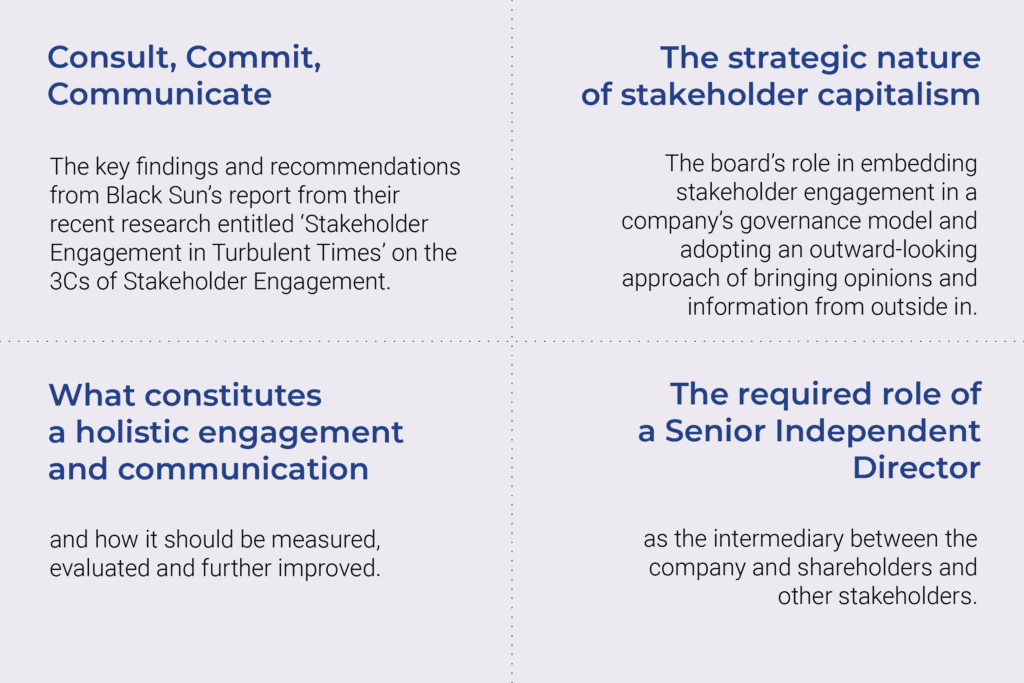“Stakeholder engagement is no longer optional in this day and age. If you want to succeed, you need to adopt a more inclusive approach by embedding stakeholder engagement in your strategic decision-making and business processes.”
Much is currently happening around the world, from the global pandemic to hot-button issues such as corruption and responsible capitalism that have dominated the global business and political agenda in recent years. It is evident that stakeholder demand and needs are getting increasingly complex. As organisations navigate within greater complexities and uncertainties, how is the role of the board evolving?
At the beginning of the Movement Control Order, ICDM conducted a survey on the preparedness of boards and directors in facing the looming crisis when COVID-19 struck and ran interviews with selected directors and CXOs on crises leadership in unprecedented times. The need for effective stakeholder communications was repeatedly mentioned. This heightened level of uncertainties has given rise to difficult questions on how companies will manage the fear and anxieties of stakeholders, and how the execution of mitigation strategies and policies can be articulated as the stakeholders of today expect companies to communicate more frequently, not less.
With each and every business vying for a competitive edge now that everyone has been put on the same level playing field as a result of the pandemic, a robust stakeholder engagement model can bring forth a dynamic capability for the company that may not only curtail the prolonged economic impact of the crisis, but garner critical perspectives from a wider stakeholder lens in terms of their purpose, values and priorities. Authentic and effective communication goes a long way towards building trust, which is a necessary element in helping companies flourish and succeed when the dust settles.
Black Sun’s recent research entitled ‘Stakeholder Engagement in Turbulent Times’ highlights and identifies the latest trends and best practices on corporate reporting and stakeholder communications, and assesses how companies are responding to challenges and changes within the reporting landscape through the evaluation and review of the annual reports and websites of companies in the FTSE Bursa Malaysia KLCI (KLCI30) and the Singapore’s Straits Time Index (STI30).
Without effective and authentic stakeholder communications, companies will become out of touch with their key stakeholders. Stakeholders and investors alike want to know about a company’s journey, especially in the current climate where absence of updates is likely more troublesome. This advocacy dialogue for directors seeks to explore the fundamental tenets of a successful stakeholder engagement model that companies can potentially adopt to foster greater confidence among their stakeholders and investors. We will be looking at:

Programme Outline
|
Wednesday | 25 Nov 2020 (Speaker: Professor Uantchern Loh) |
|
| 9.30am | Context Setting by Michele Kythe Lim, President/CEO of ICDM |
| 9.35am | Presentation Stakeholder Engagement in Turbulent Times Presentation of key findings and recommendations from Black Sun’s recent research by Professor Uantchern Loh, CEO and Corporate Culture Reporting Practice Leader, Black Sun Group (Asia Pacific) |
| 10.00am | Advocacy Dialogue The Age of Stakeholder Capitalism: Consult, Commit, Communicate Featuring a robust dialogue session between the invited panel of directors with the audience, seeking to explore the fundamental tenets of a successful stakeholder engagement model that companies can potentially adopt to foster greater confidence among their stakeholders and investors. |
| 11.30am | End of Virtual Dialogue Session |
Speaker
Professor UANTCHERN LOH
CEO and Corporate Culture Reporting Practice Leader, Black Sun Group (Asia Pacific)
Uantchern works with organisations on how to communicate their corporate culture through annual reports, internal communications, websites and social media. Through their purpose, mission and values, he helps organisations understand what stakeholders want to know about their tone at the top and corporate culture. As an adjunct professor at the School of Business, Singapore University of Social Sciences, he has taught extensively on ethics and risk management. His other research areas include corporate reporting, text analytics and behavioural science.
Download the brochure at the top right sidebar to read more.













